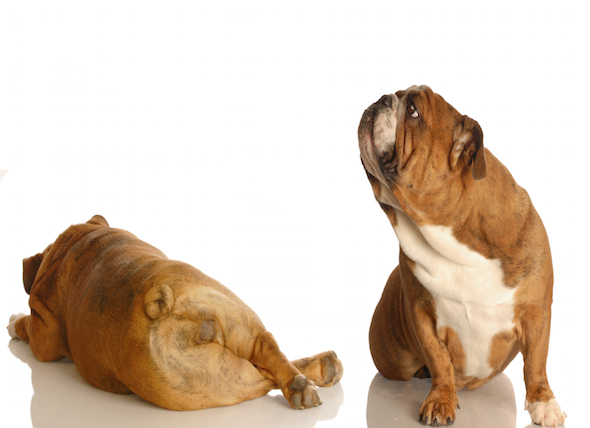

Ethanol poisoning (toxicosis) occurs from exposure to the chemical ethanol, either orally or through the skin, and results most commonly in a depression of the central nervous system -- expressed in the animal as drowsiness, lack of coordination or unconsciousness. Other effects may include damage to body cells, and symptoms such as incontinence, slowed heart rate, and even heart attack.
Ethanol poisoning is seen frequently in dogs, and occurs due to exposure to dyes, inks, disinfectants, mouthwashes, paints, perfumes, pharmaceuticals, gasoline, and certain beverages.
Symptoms of ethanol poisoning vary depending on the amount ingested, and whether the dog's stomach is full or empty. The main symptom is a depressed central nervous system, which may develop 15 to 30 minutes after ingestion on an empty stomach, and up to two hours later when ingested on a full stomach.
Other symptoms include urinating or defecating involuntarily. Higher doses of ethanol ingestion can lead to behavioral changes ranging from depression to excitement, decreased body temperature (hypothermia), slow reflexes, and flatulence if bread dough is the source of ethanol (see causes, below). Signs of advanced ethanol poisoning include depression, slowed breathing and heart rate, an increase in total body acid (metabolic acidosis), and heart attack. If left untreated, this can result in the dog's death.
Symptoms of ethanol poisoning may also be similar to early stages of antifreeze (ethylene glycol) poisoning.
Ethanol poisoning can occur from ingesting a variety of products. Fermented products such as bread dough and rotten apples, which dogs may find in the garbage, may be one case. Other accidental instances may occur from spilled beverages, commercial products, or medications containing alcohol. Exposure of alcohol-containing products through the skin is also possible.
Some cases of intentional ethanol poisoning have been reported, as dogs may readily consume alcoholic beverages if offered by an owner unaware of the consequences.
Ethanol poisoning can be diagnosed via blood tests measuring blood-ethanol concentration. A urine test for low blood sugar (hypoglycemia) may also point to ethanol poisoning, as well as a pH test measuring for heightened acid levels in the body.
Appropriate treatment for ethanol poisoning varies depending on the severity of symptoms displayed. Intravenous (IV) fluids should be provided for dehydration, and medication may be administered to alleviate central nervous system depression, as well as to inhibit the metabolism of alcohol.
In more severe cases, if your dog is having respiratory problems, artificial ventilation to aid breathing, such as with an oxygen mask, may be necessary. If a heart attack has occurred, cardiac therapy should be attended to first.
If the initial treatment is successful, symptoms should be alleviated within eight to twelve hours. Your veterinarian will follow up the initial treatment by continuing to measure blood and urine pH levels, and checking for evidence of abnormally high body acidity until the period of danger has passed.
Ethanol poisoning can only be prevented by ensuring that your dog is not exposed to products containing ethanol. Paints, perfumes, mouthwashes, fermented foods, and other products containing ethanol should be kept out of your dog's reach – preferably locked in cabinets or in secure containers.
 High Cholesterol in Dogs
Hyperlipidemia in Dogs
Hyperlipidemia is characte
High Cholesterol in Dogs
Hyperlipidemia in Dogs
Hyperlipidemia is characte
 Hyperparathyroidism in Dogs
Excessive Levels of Parathyroid Hormone in the Blood in
Hyperparathyroidism in Dogs
Excessive Levels of Parathyroid Hormone in the Blood in
 Tumor of the Thymus in Dogs
Thymoma in Dogs
The thymus is an organ in front o
Tumor of the Thymus in Dogs
Thymoma in Dogs
The thymus is an organ in front o
 Gas in Dogs
Flatulence in Dogs
Sitting next to a dog with fla
Gas in Dogs
Flatulence in Dogs
Sitting next to a dog with fla
 Lower Eyelid Droop in Dogs
Ectropion in Dogs
Ectropion is a condition which
Lower Eyelid Droop in Dogs
Ectropion in Dogs
Ectropion is a condition which
Copyright © 2005-2016 Pet Information All Rights Reserved
Contact us: www162date@outlook.com